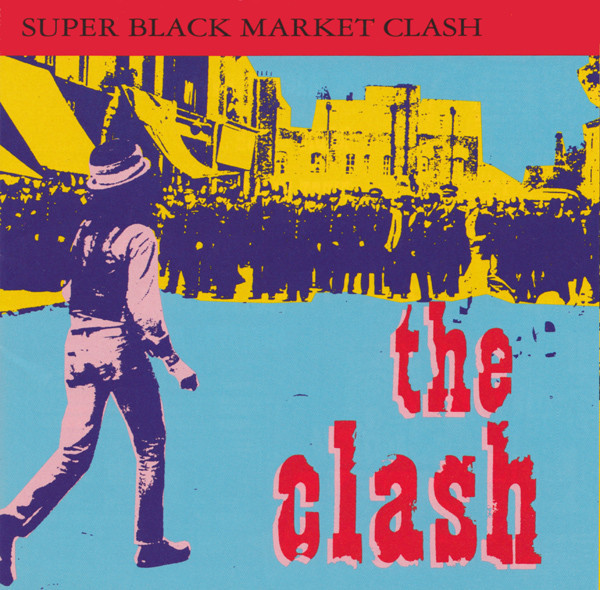With its familiar slashing chords, “Capital Radio One” was especially rare, having been included on a giveaway single. Mick Jones sings “The Prisoner” a B-side from the Give ‘Em Enough Rope era, with muddy production to match. “Pressure Drop” is an extremely enjoyable cover of the Toots and the Maytals song, which makes for an odd transition back to the angry punk of “Cheat” from the UK version of the first album. The relatively early B-side “City Of The Dead” sports prominent organ and an unexpected smooth sax part by the soon-to-be-ubiquitous Gary Barnacle, who also features on the otherwise unreleased cover of “Time Is Tight”, the Booker T. & the MG’s tune. (At the time, many listeners would recognize this from the Blues Brothers’ cover.)
Side two provides a glimpse into the band’s descent into reggae culture, which would be even more overt on their next album. “Bankrobber” was the band’s newest single in the UK, featuring production work by Jamaican pioneer Mikey Dread; here it appears in an extended mix with a “Robber Dub” coda. More successful is “Armagideon Time”, a cover of a fairly recent reggae hit that had been the B-side of “London Calling” overseas. Here it’s followed by “Justice Tonight/Kick It Over” a dub version of the song running seven minutes.
As with most grab-bags, Black Market Clash is a little disjointed, but the songs make it worth it. In the digital era, the band had already been anthologized on a two-record set as well as a box set, so a simple CD transfer of the album wouldn’t have sufficed. Rather, Super Black Market Clash (clever!) presented a vast expansion of the original, for a more comprehensive (though not complete) rarities collection. To cut down on duplication from those other compilations, “Capitol Radio One”, “Cheat”, “Bankrobber”, and “Armagideon Time” were dropped. Meanwhile, “Pressure Drop” was a different mix, “Justice Tonight/Kick It Over” was extended another two minutes, and “Robber Dub” was also more complete. (The set was also issued on vinyl as three 10-inch discs—clever again!—with four extra songs from the UK version of the debut filling up the first side: “Protex Blue”, “Deny”, “48 Hours”, and the reinsertion of “Cheat”.)
The new set opens with “1977”, the classic B-side of their first single with its bold declaration of “no Elvis, Beatles, or Rolling Stones.” “Listen” was previously sampled on that “Capital Radio” single, used as the bed of an interview; here’s it’s the full track but still instrumental. “Jail Guitar Doors” is repeated from the US version of the first album, followed by some of the repeats from the original set. Then there’s “1–2 Crush On You”, a surprising homage to sixties pop, with its allusions to “Wooly Bully” and “Twist And Shout”. Three songs from 1979’s The Cost Of Living E.P. follow: the misleadingly tuneful “Groovy Times” with its harmonica and acoustic guitar touches; the mildly soul-influenced “Gates Of The West”; and the “Capital Radio Two” re-recording. Sadly, the advertisement for the EP, which originally closed side two, is absent.
Following the lengthy dub tracks from the original set, the set moves to collecting material that postdated it, and since most of those are also dub versions, the sequencing is logical. These include “The Cool Out” (a danceable dub version of “The Call Up”), “The Magnificent Dance” (which piles completely arrhythmic bongos on the disco track for “The Magnificent Seven”), “Radio Clash” (the nearly identical B-side version of that single), and “Mustapha Dance” (an enjoyable rejig of “Rock The Casbah”). In between, “Stop The World” was a rare B-side with little musical quality, while “First Night Back In London” and “Cool Confusion” were outtakes from the double album that was shaved down for Combat Rock and “Long Time Jerk” also dates from the that period.
Where Black Market Clash made a nice stopgap in 1980, Super Black Market Clash becomes more of an afterthought. But listeners already following the band’s catalog knew that Clash B-sides were just as good as their album tracks. Clearly this band had plenty to say, and most of it was worth hearing.
The Clash Black Market Clash (1980)—3½
The Clash Super Black Market Clash (1993)—3½


No comments:
Post a Comment